Vampire Therapist asks: can a game really teach the fundamentals of therapy?
Freud or fraud?
Of all the places I expected to learn some fundamental lessons about therapy, playing a game about vampire therapists was not one of them. Yet I have, and now I wonder why I excluded such a possibility in the first place. Games do have a unique power in their interactivity that's perfect for education (though I've sat through enough awful corporate training videos attempting to do the same thing). That Vampire Therapist can teach me concepts usually associated with stuffier education shouldn't really be surprising, then. What's surprising is no one has tried this approach for this topic before.
Vampire Therapist is a game about seeking and then giving therapy, specifically cognitive behavioural therapy. I've experienced a bit of this in my real life. From what I understand, it's a way of altering thought patterns to identify unhelpful ways of thinking. It also offers skills to help cope with problematic situations. It's the talking part of the therapy I've seen the game focus on, though I've only played a few hours. And it has been developed with the help of licensed therapists, so it's not all a bunch of hooey.
Excuse the American slang, but I've picked it up from the character in the game you will play as: Sam Walls, a cowboy from the Wild West who left a life of bloody gunslinging behind him to sort out his head and come to terms with the bad things he'd done. It's in the name of this quest he heads to Leipzig, Germany, in the present day, to meet millennia-old vampire therapist Andromachos and learn more. Sam already has the makings of a therapist - he's come to many realisations himself - but it's Andromachos who formalises his training and helps shape him into the therapist he becomes.
It's a visual novel kind of affair, a conversational kind of game. Gameplay almost always revolves around two talking-head characters chatting (with voice acting). The only time I've seen that change is when I had to bite someone's neck - I had to time my button-press to stop my fangs directly over someone's jugular, which was quite fun. Most of the time though, it's conversations.
In those conversations you have a couple of dialogue choices but the point is really to provide a place where you can highlight cognitive distortions when you see them. Cognitive what-nows? Exactly - it's here the game gets therapy-ish, but it never swamps you. Cognitive distortions are ways of talking that aren't helpful. Already, at the beginning of the game, Sam has worked out a few for himself. He's given them his own names: Hot Branding, High Noon Mind, and Saloon Thinking.
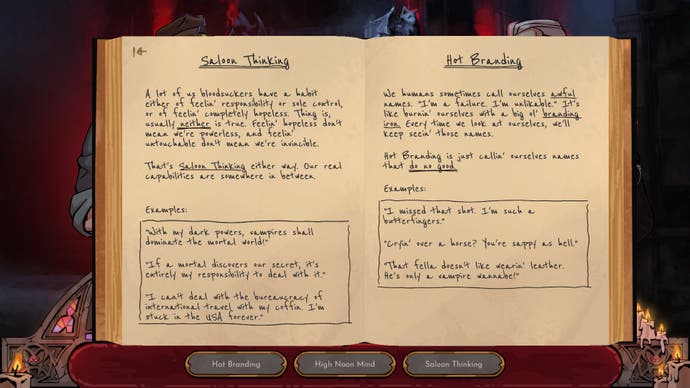
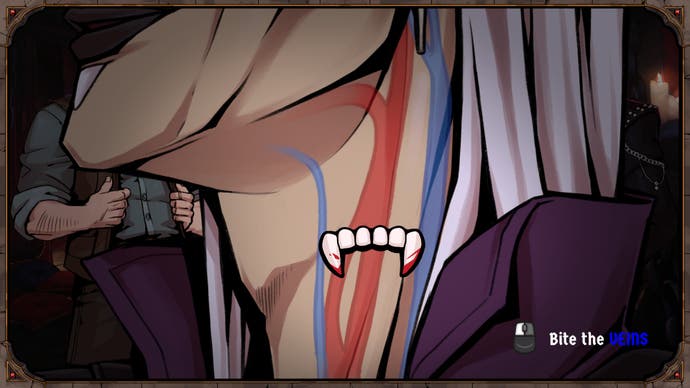
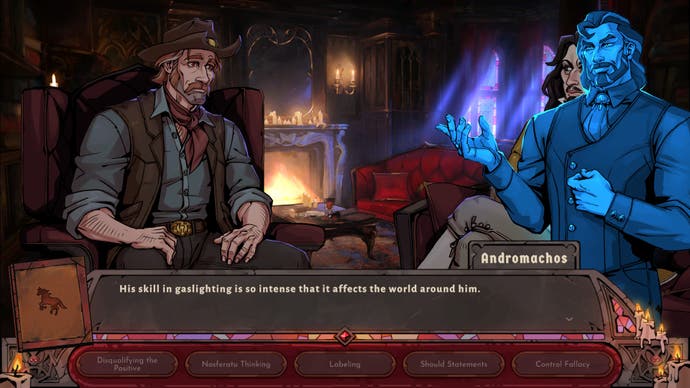
Hot Branding is where people call themselves names - Sam likens this to branding oneself with a hot iron. High Noon Mind refers to someone talking in all-or-nothing extremes, as if a situation were do or die. And Saloon Thinking is how someone might talk in a bar, either full of confidence or full of self loathing. Andromachos formalises these as Nosferatu Thinking (a play on it being a black-and-white film and the statements being black and white; High Noon Mind), as Labelling (Hot Branding), and as Control Fallacy (Saloon Thinking), and he soon adds a couple more: Disqualifying the Positive, and Should Statements. These then appear as buttons beneath conversation text, which can be pressed whenever you recognise someone talking in that way.
As I said, you're eased into this gently. The Sam character is good at thinking out loud about things, Andromachos is a good teacher, and there's a detailed but not too dense journal with extra information if you want it. A lot of effort has been made to make the information approachable. The game moves slowly: first it's Andromachos probing Sam, then it's Sam probing patients, the complexity building the more you play. That the game doesn't take itself too seriously - it cites famous Vampire properties like What We Do in the Shadows as inspiration - helps alleviate any stuffiness enormously. I've barked out laughs a couple of times; it's a game that's fond of a joke. It helps that Sam is likeable too - he reminds me a lot of Ted Lasso, both in his accent and his relentless enthusiasm, and in his constant willingness to philosophically pick people up, while Andromachos is patient and calm.
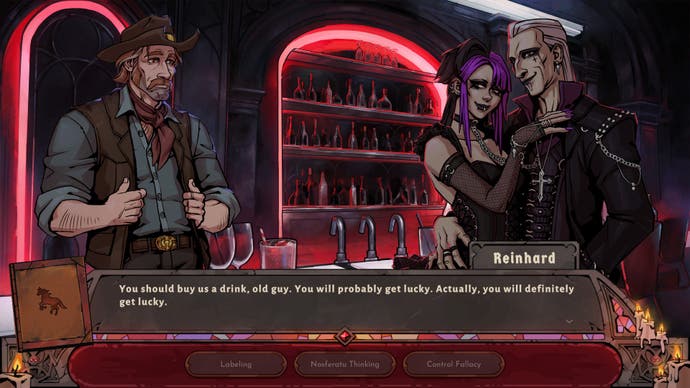
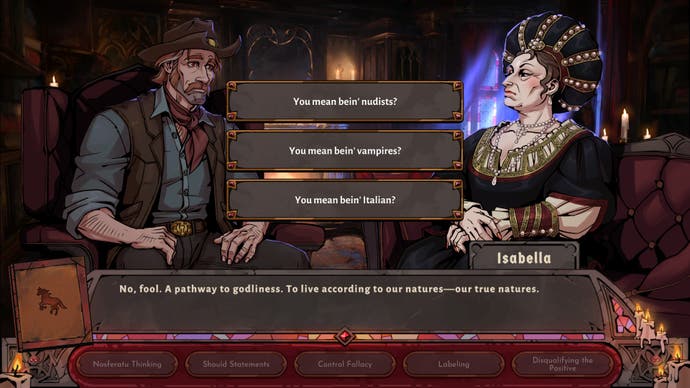
What still surprises me about Vampire Therapist, though, is how potent an easy-going game can be when teaching real, weighty therapy concepts - though there's a wider question about whether that's a responsible thing to do; it can be a dangerous thing to self-diagnose, or worse, impose your views on someone else. But the impression I get from the game in this regard is a responsible one. It seems more concerned with heightening understanding about cognitive behavioural therapy rather than in any way replacing it. It also never loses sight of the fact that it is a game - that it is entertainment. Partly, that's why it's so easily absorbed. You just watch a bunch of conversations and try to identify cognitive dissonances as they surface, and if you get it wrong, it doesn't matter: Andromachos says try again.
Gradually it sinks in - and I mean really sinks in. I'm taking on board advice and lessons I learnt in the game. I'm watching for "shoulds" in my sentences and all-or-nothing declarations I make. I'm looking for ways I've pressurised situations needlessly, and how I might relieve that. I'm being a bit kinder to myself, and it's nice. It's positive. And it's remarkable how quickly and subtly a game can have that effect.
A copy of Vampire Therapists was provided by Little Bat Games.

